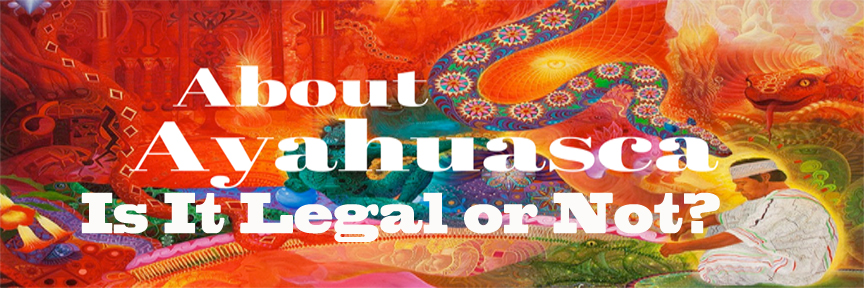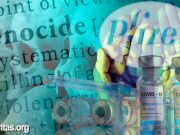
Ayahuasca Legal Status in the US
Republished as a public duty from the original publication of the Santo Daime Organization , that cautions readers:
All legal information should be verified through other sources.
http://ayahuascadefense.com/index.php/national-legal-status/
Ayahuasca legal status is summarized in this report. Ayahuasca (which contains DMT) is illegal to import, consume, possess, sell, and distribute in the United States with a judicially granted exception for the syncretic Christian churches União do Vegetal (UDV) and the Santo Daime (in Oregon and Los Angeles) based on religious freedom. These exceptions only apply for these specific religious groups, and were obtained after protracted legal battles that, in the case of the UDV, reached all the way to the Supreme Court.
The DMT in ayahuasca is a Schedule I controlled substance regulated by the Controlled Substances Act (CSA). The statutory maximum punishment for possession or import of DMT or a substance found to contain DMT is 20 years imprisonment. There have been several legal incidents related to ayahuasca in the USA, however so far no person has ever been sentenced to prison for ayahuasca, but people have been arrested for it.
Although the Native American Church has an exemption from the CSA for the sacramental use of peyote, ayahuasca legal status for this exemption does not apply to sacramental use of ayahuasca.
NATIONAL DRUG LEGISLATION
DMT is regulated under Schedule I, section c), of the 2000 Controlled Substances Act (CSA), which includes hallucinogenic substances.
According to the 2006 U.S. Supreme Court decision in the case Gonzales v. O Centro Espirita Beneficente União do Vegetal (more details below) ayahuasca would be illegal to import/export to the U.S. under Article 7 of the 1971 United Nations Convention on Psychotropic Substances.
Affecting ayahuasca legal status, the Court interpreted ayahuasca as a “preparation” containing a substance (DMT) covered by the Convention. Also, people receiving ayahuasca may be arrested or have their shipments seized in customs. The unprepared plant ingredients of ayahuasca, Banisteriopsis caapi vine and Psychotria viridis leaves may be subject to import restrictions in the United States, even if these plants are not scheduled under the international drug control conventions. People importing B. caapi and P. viridis to make ayahuasca with have been arrested.
National CSA regulations do not apply to the plants B. caapi and P. viridis. Like some mescaline-bearing cacti including San Pedro, Trichocereus peruvianus, the plants B. caapi and P. viridis are legal to grow, buy and sell but illegal to prepare and consume.
The only group with a federal exemption from prosecution under the CSA for ayahuasca (hoasca for the UDV) is the UDV. The UDV is registered with the DEA as a legal importer, distributor and manufacturer of the controlled substance hoasca. The UDV achieved this right through a successful legal challenge decided by the United States Supreme Court (see below). Three Santo Daime churches in the State of Oregon received a federal exemption from prosecution, and there is also a registered legal Santo Daime church in Los Angeles.
COMPLEMENTARY / MISCELLANEOUS INFORMATION
The ayahuasca legal status for indigenous peoples’ use of the “tea” in the U.S. is unclear although the case of Tatai Juan certainly indicates that the DEA considers its use subject to control. Ayahuasca use is indigenous to the Upper Amazon. At the moment of adhesion to the 1971 Convention, the United States made a reservation to Article 7 so that the peyote cultivated, distributed and used by the Native American Church could remain part of their religious rituals, but this reservation does not apply to ayahuasca.
The Native American Church has an exemption from the CSA for the sacramental use of peyote, but that exemption that does not apply to ayahuasca. Members of the Native American Church using ayahuasca as a sacrament should be aware that until one of them is arrested, brought before a court of law, and advances a successful RFRA claim, they will not be exempt from prosecution under the CSA.
The Oklevueha Native American Church’s (ONAC) RFRA claims have already failed several times for sacramental use of cannabis (see the case Oklevueha Native Am. Church of Hawaii, Inc. v. Holder). Another ONAC cannabis case from western Michigan resulted in a church member being sentenced to 18 months in prison.
Indigenous Amazonian healers and shamans entering the United States, as well as organizations facilitating their entry, should be aware that they may be arrested and their ayahuasca may be seized, as was the case of the renowned indigenous leader Taita Juan.
MYTHS & REALITIES OF AYAHUASCA LEGALITY
http://ayahuascadefense.com/index.php/beliefs-and-facts/
Ayahuasca is considered cultural heritage and therefore is legal.
Reality: False. Cultural heritage and drug legislation and law enforcement are different things. In some countries, such as Peru, ayahuasca is cultural heritage and it is legal. But unlike in those countries where ayahuasca is indigenous, in most countries ayahuasca is not recognized as a cultural heritage.
If your church or group is legal, you can import and export ayahuasca legally.
Reality: False. Consumption and import/export are different things, controlled by different laws. Even when personal use of controlled substances is decriminalized, importing those same substances can result in criminal prosecution for international drug trafficking. For example, Santo Daime and UDV can legally consume ayahuasca in some countries, yet still face legal challenges importing it.
Online sites that sell ayahuasca are legal or else they would not be selling it.
Reality: False. Some online retailers have commercialized the sale of B. caapi and P. viridis (the two plants that are used to make ayahuasca). The Deep Web may also be an online source for ayahuasca. Depending on the country, there may be some ambiguity about the legal status of selling or buying ayahuasca. While there may be a risk for the seller, the recipient can also face investigation or arrest. It is important to note that what matters is the legal status of ayahuasca in the country where the package is received.
That a group is legal because it has a site, and their ceremonies are available on Facebook. If it were not legal, it would not be available on line. If they were illegal, they would already have been arrested.
Reality: False. People conducting ceremonies in countries where ayahuasca is illegal to consume should be aware that they would be seen as violating the law. They might get arrested in the future.
Ayahuasca has healing properties, therefore it is a medicine.
Reality: While this is true from native points of view, as far as mainstream science this is not yet proven or considered a fact. Nonetheless, the body of positive scientific evidence about ayahuasca and its effects is growing. However when people characterize ayahuasca as a ‘medicine’ they might create additional risks for themselves (as well as prosecution possibilities) as in most countries the practice of medicine without a license is considered a crime.
If there were a police raid in an ayahuasca session, only the leaders would get in trouble.
Reality: There have been police raids of ayahuasca sessions where police officers arrested both leaders and participants. There have also been reports of police investigations into the computers of leaders that led to arrests of session participants.
A group filled in agricultural papers to import ayahuasca, or paid taxes on the importation, therefore they are legal.
Reality: Different government agencies might act independently and people might have problems later down the road.
Traditional healers from South American countries where ayahuasca is legal can legally import and administer ayahuasca in the United States or Europe.
Reality: False. Some indigenous healers entering the United States have been arrested and had their ayahuasca seized by customs and the individuals subsequently deported. Whereas it might be easier to argue for liberty if you are indigenous, it is not guaranteed. To the drug control authorities you would likely still be seen as an unlicensed importer of a controlled substance.
Why Was Taita Juan Released?
https://erowid.org/chemicals/ayahuasca/ayahuasca_law28.shtml
Since the charges were dropped and there was no trial, Taita Juan’s case set no precedents. The question of whether an indigenous shaman can lead ayahuasca ceremonies in the United States is still open.
Ayahuasca is legal in the USA because the UDV went all the way to the Supreme Court and got its use of ayahuasca approved.
Reality: False. The Supreme Court upheld a preliminary injunction allowing the UDV to import its sacrament, but this permission is valid only for the UDV. (Some local branches of Santo Daime have had their own independent legal process, see below). Today the UDV’s use of its sacrament is licensed, under very specific conditions, by the DEA.
Paradoxes of ayahuasca expansion: The UDV–DEA agreement and the limits of freedom of religion
https://www.researchgate.net/profile/Beatriz_Labate/publication/232072349_Paradoxes_of_ayahuasca_expansion_The_UDVDEA_agreement_and_the_limits_of_freedom_of_religion/links/54fd9f500cf270426d12c65c.pdf?inViewer=true&disableCoverPage=true&origin=publication_detail
The Santo Daime Church is legal in the United States as well.
Reality: There was a decision by a Federal Judge in the State of Oregon that the Federal Government could not prosecute members of three churches in that state for their ritual use of the daime. That decision only applies to those three churches. Recently, a Santo Daime group in Los Angeles applied directly to the DEA for an accommodation to operate and was approved as well. Other Santo Daime churches in the United States did not receive any legal protection (or exemption from prosecution) as a result of these decisions.
The Santo Daime and UDV churches are recognized by the State as legitimate religious association; therefore, they may legally use ayahuasca.
Reality: False. Legislation regulating religion and religious practices is independent of drug laws and law enforcement.
The Native American Church’s exemption for peyote applies to ayahuasca.
Reality: False. Peyote and ayahuasca are treated differently. The Native American church does not have an exemption for ayahuasca.
ONAC and James Mooney won a legal case; therefore, their church is legal.
Reality: False. Winning a legal case is not the same as being legal (see above). ONAC and James Mooney won a legal case for the use of peyote in the state of Utah, not for ayahuasca, in that state or any other. Their peyote exemption in Utah does not extend to ayahuasca or any other sacramental ethnobotanical listed on their membership cards. Membership to ONAC has already failed as a defense for cannabis possession a number of times.
Ayahuasca is legal because the INCB issued a letter saying it is not under international control.
Reality: It is true that the INCB issued a letter saying the plant ingredients of ayahuasca are not controlled under the 1971 Convention on Psychotropic Substances and therefore the ayahuasca prepared from them is not controlled. However in a court case the judge still does the final interpretation of the evidence and past cases have occurred in which the INCB’s interpretation was not accepted. The Supreme Courts of both the United States and the Netherlands rejected it. Instead, both said ayahuasca is a “preparation” containing DMT and therefore controlled under the Convention. However, in other cases in Chile, Spain or Switzerland, the interpretation of the INCB was accepted leading to various acquittals.
CASES
Alan Thomas Shoemaker (2002) A U.S. expat living in Iquitos (Peru) and Atlanta was arrested and imprisoned for importing 450 kilos of unprepared ayahuasca ingredients in the form of vine and leaf from Peru into the U.S. Facing the possibility of 20 of imprisonment, Alan left the United States and is currently living and working in Iquitos where he is active in the local ayahuasca community. The charges against him have not been dismissed and Alan would likely be arrested if he ever tries to return to the US.
Gonzales v. O Centro Espirita Beneficente Uniao do Vegetal 546 U.S. 418 (2006)
Though no charges were filed, after U.S. customs seized 30 gallons of their sacrament hoasca (ayahuasca) intended for the Santa Fe, New Mexico branch of the UDV, the UDV filed a lawsuit claiming that the seizure was a violation of their right to religious freedom and seeking for the hoasca to be returned. The UDV claimed its use of hoasca was permitted under the 1993 Religious Freedom Restoration Act (RFRA). After seven years of litigation, the Supreme Court found that the government’s compelling interest in prohibiting the UDV’s use of hoasca did not stand up to the strict scrutiny required by RFRA and therefore that the UDV once registered with the DEA could use hoasca in their religious services throughout the United States.
Church of the Holy Light of the Queen v. Mukasey 615 F.Supp.2d 1210 (D.Or 2009) vacated in part by Church of the Holy Light of the Queen v. Holder 2011 WL 2784084 (9th Cir. 2011)
After judicial proceedings (triggered by a government seizure and the arrest of a church member) a group of 3 Oregon CEFLURIS (a particular branch of Santo Daime) churches achieved the right to use Daime (ayahuasca) used in the practice of their religion. Their right to import and distribute Daime is currently limited to congregations in Oregon and Los Angeles, where the individual churches proactively comply with certain DEA regulations, track their ayahuasca inventory, and have individualized permits to transport ayahuasca through customs. Their right, like the UDV’s, is based on using the Religious Freedom Restoration Act (RFRA) to get an exemption from the requirements of the Controlled Substances Act (CSA).
Taita Juan (2010)
Taita Juan Agreda Chindoy, a Cametsa traditional healer and Colombian national, was stopped in customs in the Houston International Airport, on October 19, 2010 formally arrested, and detained for possession of ayahuasca. Charged with possession and intent to distribute DMT, he faced up to 20 years in federal prison. Just five days after Taita Juan’s arrest a website was up and receiving donations for his legal defense fund as a grassroots international support network spread across Latin America, Europe, and the United States. Taita Juan’s supporters hired an attorney and charges against him were conditionally dropped on November 16, 2010. Taita Juan was deported back to Colombia. Taita Juan’s legal advisory team included Nancy Hollander, a lead attorney from Gonzales v. O Centro Espirita Benificiente Uniao do Vegetal.














